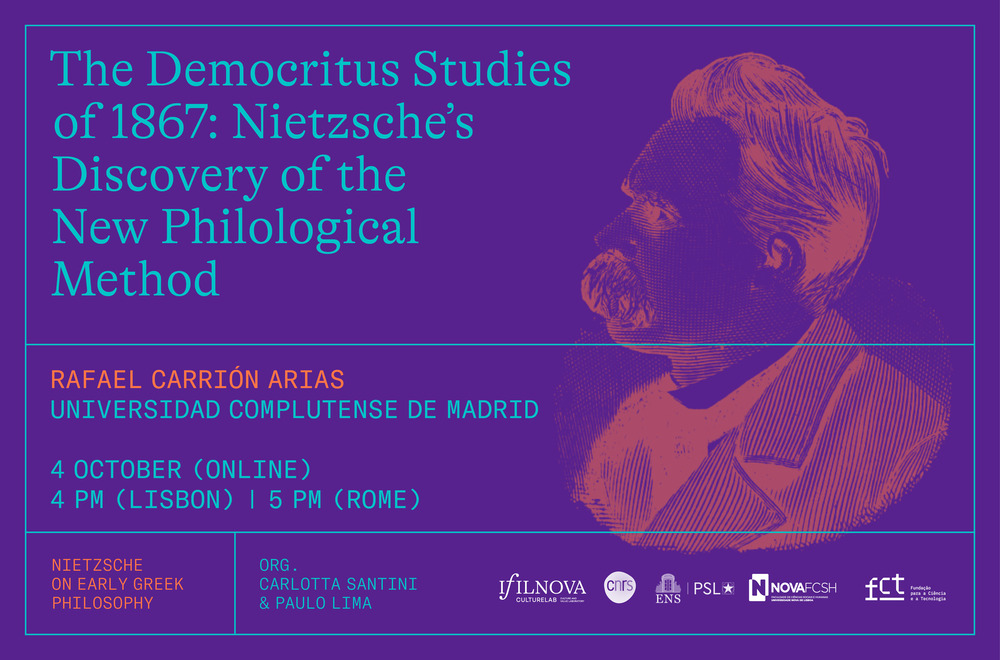Rafael Carrión Arias

“If by researching the lost writings of Democritus I can do no more than whet the appetite for hopelessly lost food, I will have achieved only half of what I intend. We owe Democritus a funeral, so that his angry spirit may at last leave us in peace. And against whom has one not sinned as much as against Democritus? Is not his life a martyrdom for science?”
KGW I, 4, 57 [39], Autumn 1867-Spring 1869.
The years between his intellectual beginnings and the crisis of 1879 (the year of publication of Human All Too Human and the beginning of his activity as a “wandering philosopher”) are for Nietzsche a period of attempts to articulate for science the possibility of a creative impulse for the future while at the same time preserving its scientific character. It is a vocation ultimately called to overcome the structural crossroads in which modern science had been trapped between positivity and ideal by redefining the relation of science to life. As a result of this task, he produces a series of well-known cycles and conferences in which the conflict of philology with itself is perceived in the abstract.
And yet, the sets of methodological possibilities offered by this series of texts, lessons and discourses do not occur in Nietzsche originally from the level of the theoretical, but from his practical activity as a philologist. It is the attempts to find solutions to certain problems of textual practice that gradually lead him to become aware of the methodological question. The first exercise leading to this theoretical clarification are the Democritean studies of 1867-1868 or the practical philological studies on the authenticity or inauthenticity of the texts of the philosopher of Abdera, and these studies are the place where Nietzsche’s skeptical philology itself is gestated.
The present conference sets out to present in detail the way in which such a task took place, at a time of fundamental importance for the foundation of the future critical-genealogical method and very little studied by the Nietzscheforschung to date. In addition to its purely philological contribution in the field of textual criticism (of Democritus as well as of Nietzsche), our work will attempt to offer solid reasons for affirming a continuist position on Nietzsche’s work and scientific methodology through a reconstruction and analysis of these valuable notes.
Nietzsche On Early Greek Philosophy | Online Seminar
Org. Paulo Lima (Lisbon Nietzsche Group/Research Group on Ancient Philosophy/IFILNOVA) and Carlotta Santini (CNRS/ENS, Paris)
The seminar seeks to explore the dialogue between Nietzsche and early Greek philosophy during the period when he was Professor of Philology at the University of Basel. This is a subject that has not been studied in a systematic way, although there are some decisive contributions showing its importance for understanding Nietzsche’s philological and philosophical thinking. Our purpose is to provide a platform on which contributions from specialists in Nietzsche and ancient philosophy can be presented, debated, and complemented to fill this gap in Nietzschean studies. Key topics of the sessions will be Nietzsche’s activity as a scholar of ancient doxography on early Greek philosophy, his general conception of what he called the “pre-Platonic philosophers”, as well as his interpretation of some of these philosophers. The body of texts to be studied during the sessions includes not only the published ones, but also Nietzsche’s lectures, notebooks, and correspondence. The seminar is part of the activities of the Lisbon Nietzsche Group and the Research Group on Ancient Philosophy (CultureLab/IFILNOVA). It is the result of a collaboration between IFILNOVA, the Centre Nationale de Recherche Scientifique, and the École Normale Supérieure (Paris). It will take place monthly starting from October 2023 and will have nine sessions. It will be open to all interested parties, who will be able to register for each session by contacting the organizers (plima@fcsh.unl.pt, carlottasantini@hotmail.it). For more details, please see the programme below.
Next sessions
Session 2
8 November, 4 PM (Lisbon) | 5 PM (Rome) | for other locations click here.
Eduardo Nasser (Universidade Federal de Pernambuco), “Considerations on Nietzsche’s Use of Anaxagoras in His Quarrel with Eleatism”
Session 3
6 December, 4 PM (Lisbon) | 5 PM (Rome) | for other locations click here.
Babette Babich (Fordham University), “To Hell and Back: Nietzsche’s Empedocles, Nietzsche’s Pythagoras, and Zarathustra”
Session 4
24 January, 4 PM (Lisbon) | 5 PM (Rome) | for other locations click here.
Matthew Meyer (University of Scranton), “The Unity of Opposites: A Fundamental Principle in Antiquity and Today”
Session 5
28 February, 4 PM (Lisbon) | 5 PM (Rome) | for other locations click here.
Helmut Heit (Klassik Stiftung Weimar), “Nietzsche and Protagoras”
Session 6
27 March, 4 PM (Lisbon) | 5 PM (Rome) | for other locations click here.
Yannick Souladié (ENS, Paris), “The ‘Tremendous Leap of Anaximander’: Nietzsche’s New Understanding of the Apeiron”
Session 7
8 May, 4 PM (Lisbon) | 5 PM (Rome) | for other locations click here.
André Laks (Universidad Panamericana, México/Sorbonne Université, Paris): “Nietzsche doxographus”
Session 8
5 June, 4 PM (Lisbon) | 5 PM (Rome) | for other locations click here.
Daniel Conway (Texas A&M University), “How Socrates Became What he Was: The Evolution of a Diagnosis”
Session 9
19 June, 4 PM (Lisbon) | 5 PM (Rome) | for other locations click here.
Anne Merker (Université de Strasbourg), “Nietzsche, Heraclitus, and Polemos”
Event supported by the Foundation for Science and Technology (Fundação para a Ciência e para a Tecnologia) of the Portuguese Ministry of Education and Science under the projects UIDB/00183/2020 and UIDP/00183/2020.

